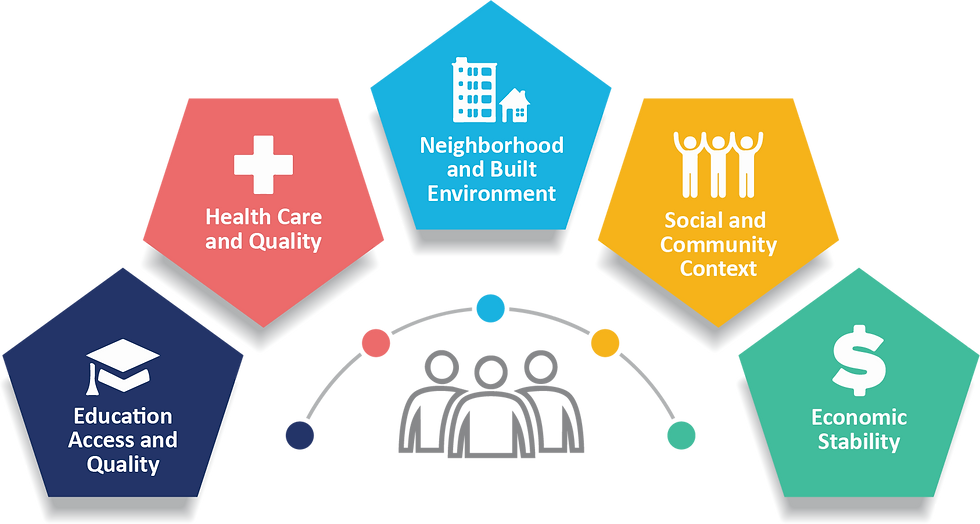The Ottawa Charter for Health Promotion: Relevant but Largely Unhelpful
- LeanneMireault

- May 16, 2023
- 3 min read
At the time of its publication in 1986, the Ottawa Charter for Health Promotion represented a significant and monumental leap forward for the field of health promotion. More than 35 years later, this international agreement is often considered to have laid the foundation for subsequent global health efforts (Dugani et al., 2017), and is still frequently referenced within the field. However, much about the world has changed in the intervening years, causing many to ponder the relevance of the Charter in the modern age. To which I would attest that, though it may still be relevant, the Charter is far from being useful.

(Centre for Disease Control and Prevention, nd)
By explicitly positioning a person’s health status as being a product of their environment and daily life circumstances (Potvin & Jones, 2011) the Charter was the first of its kind to suggest the need think beyond the narrow confines of the healthcare system to affect health in meaningful ways. In 2023, there is little doubt that the social determinants of health have a sizable impact on determining the health outcomes of individuals and communities. No modern public health professional would argue with the need to address income inequality, educational disparity, or housing instability as a means of improving health. Yet, though its relevance in this regard remains unquestionable, where the document falls short is on providing actionable steps for how these problems and inequalities should be tackled.
That, as I see it, is the problem with the Ottawa Charter as a whole. Though filled with hopeful platitudes and utopian ideals (think: “create supportive environments” or “strengthen community action”) the Charter provides little in the way of actual steps or actionable approaches for how to make these ideals come to fruition. Even its often lauded five “Action Steps” are vague, un-prescriptive and therefor largely unhelpful. In a similar vein, the document speaks of empowering individuals and communities, but does not do so in any way that clearly translates this into action (Dugami et al., 2017).
Worse than being unhelpful, the action step “Develop personal skills” may have been detrimental to health promotion efforts since the Charter’s publication. A 2019 study by Wilberg et al. which sought to examine the relevance of the Charter as perceived by European public health professionals, found that this action item was the most frequently used or referred to in health promotion programs. Fry (2020) echoes this finding, concluding that governments and health organizations continue to be attracted to individual education or behaviour modification approaches to health promotion. This provides evidence that, while the Charter may have provided inspirational fodder, it has not resulted in a substantial shift in health promotion efforts to focus on more upstream or high-level policy measures. The inclusion of “develop personal skills” in the Charter has essentially provided governments and policy makers with an easy out to allow them to “check the box” for engaging in health promotion, while continuing to focus on the individual as a source of their own health problems.
In hindsight, the Charter was a good starting point. In many ways it legitimized the field of health promotion (Potvin & Jones, 2011) and it did draw much needed attention to the need to address the social determinants of health and to work collaboratively between agencies and stakeholders. Decades later, its relevancy remains: the issues presented by the charter are yet to be resolved (Willberg et al., 2019). However, in the absence of concrete steps or methodologies for how to address these issues or make action towards the five “action steps”, it remains a hopeful but largely unhelpful document.
References
Centre for Disease Control and Prevention (nd). Social determinants of health [Image]. CDC website. https://www.cdc.gov/publichealthgateway/sdoh/index.html
Dugani, S., Bhutta, Z. A., & Kissoon, N. (2017). Empowering people for sustainable development: the Ottawa Charter and beyond. Journal of Global Health, 7(1). https://doi.org/10.7189/jogh.07.010308
Fry, D. (2020). Language and framing as determinants of the predominance of behavioural health promotion: an Australian view. Health Promotion International, 35(3), 624–631. https://doi.org/10.1093/heapro/daz039
Potvin, L., & Jones, C. M. (2011). Twenty-five Years After the Ottawa Charter: The Critical Role of Health Promotion for Public Health. Canadian Journal of Public Health, 102(4), 244–
Wilberg, A., Saboga-Nunes, L., & Stock, C. (2021). Are we there yet? Use of the Ottawa Charter action areas in the perspective of European health promotion professionals. Journal of Public Health, 29(1), 1–7. https://doi.org/10.1007/s10389-019-01108-x




Comments